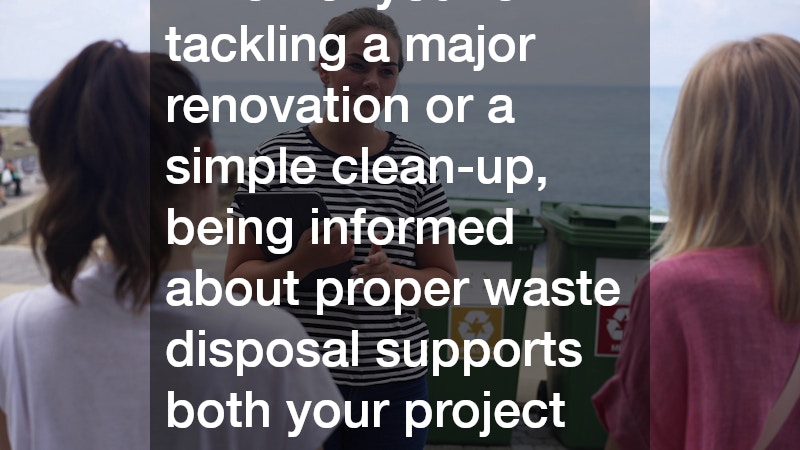Skip bins are an incredibly convenient solution for waste disposal during renovations, garden clean-ups or major decluttering efforts. They offer a simple, effective way to manage large volumes of rubbish without the hassle of multiple trips to the tip. However, it’s essential to understand what materials are suitable for disposal in skip bins, as some items are strictly prohibited due to safety, environmental or regulatory concerns.
Knowing the dos and don’ts not only protects the environment but also helps you avoid extra charges or penalties.
Understanding What Belongs in a Skip Bin
When hiring skip bins, most people assume they can throw away just about anything. While these bins are designed to accommodate a wide range of waste types, there are clear limitations on what they can legally and safely hold. Typical household items such as old furniture, general rubbish, cardboard and green waste are generally acceptable. These materials are non-hazardous and many can be recycled or processed without issue once collected.
Construction and demolition waste, such as bricks, concrete and tiles, are also commonly accepted in designated skip bins. It’s important to choose the correct bin type if your waste includes heavy materials, as overloading or misclassification can result in additional fees or safety concerns during transport.
Clean fill, which includes soil, sand and clay that’s free from contaminants, is another item usually permitted. Some skip bin providers even offer specialised bins for recyclable materials, encouraging better waste management and resource recovery.
Hazardous Items That Are Not Allowed
Despite their versatility, skip bins cannot be used for certain items that are deemed hazardous or pose health and environmental risks. Asbestos is one of the most well-known banned substances and for good reason. Even minor exposure to asbestos fibres can be harmful, so it must be removed and handled by certified professionals using specialised containment and disposal methods.
Batteries, particularly car and lithium batteries, are also not allowed in skip bins due to their potential to leak chemicals or start fires. These need to be disposed of at specific recycling centres or collection points that are equipped to handle them safely.
Chemicals such as paints, solvents, pesticides and cleaning agents also fall under the prohibited category. These substances can contaminate the entire load and damage processing equipment, leading to environmental damage if not disposed of properly. Similarly, medical waste, which may include sharps or pharmaceutical products, is banned due to the risks of infection or contamination.
Electronic Waste: A Special Consideration
Electronic waste or e-waste, is increasingly becoming a concern due to the growing reliance on digital devices. Items like televisions, computers, printers and mobile phones contain valuable materials that can often be recycled, but they also include hazardous components such as heavy metals and chemicals.
Some skip bin companies may allow e-waste in specific bins if they partner with certified recyclers. However, many prefer these items to be taken to designated e-waste drop-off points to ensure proper dismantling and recycling. It’s always best to check with your skip bin provider before including electronic items in your load.
Whitegoods & Appliances: Yes, But With Caution
Old fridges, washing machines, ovens and other household appliances are often accepted in skip bins, but there are conditions. For example, refrigerators and air conditioners must be professionally degassed before disposal to remove ozone-depleting substances. If left untreated, these gases can contribute to environmental harm.
Other whitegoods like dishwashers or microwaves can usually be included without issue, but it’s always wise to confirm in advance. These items often take up considerable space, so you may need a larger bin or a different disposal strategy if you’re handling multiple appliances at once.
Mattresses & Bulky Furniture: Accepted With Additional Charges
Large items such as mattresses, bed frames and sofas are typically allowed in general waste skip bins, but they may incur extra fees. Mattresses, in particular, require special handling due to their complex materials, which include metal springs, foam and fabric. Some providers may even request that you separate these items for easier processing.
Before placing these bulky items in your skip bin, check with the supplier regarding any additional costs or preparation requirements. In some cases, local councils may also offer free collection services, providing a more cost-effective disposal option.
Tyres, Gas Bottles & Oils: Strictly Forbidden
Due to their potential for environmental harm and fire risk, tyres, gas bottles and motor oils are strictly banned from skip bins. Tyres are made from durable rubber and steel, which require specialised recycling facilities. Disposing of them improperly can attract heavy fines.
Gas bottles, even when seemingly empty, pose a serious explosion risk and must be returned to approved refill or recycling stations. Likewise, motor oils and other automotive fluids are flammable and can contaminate soil and water supplies, making them unsuitable for general disposal.
Make the Most of Your Skip Bin Responsibly
Skip bins provide an efficient way to manage rubbish, but using them responsibly is key to maintaining safety and environmental integrity. Understanding what can and cannot be placed in skip bins ensures you stay compliant with local regulations and avoid unnecessary fees. Whether you’re tackling a major renovation or a simple clean-up, being informed about proper waste disposal supports both your project and the planet. By choosing the right bin type and following the rules, you’ll make the most of this valuable service while keeping your surroundings clean and hazard-free.

